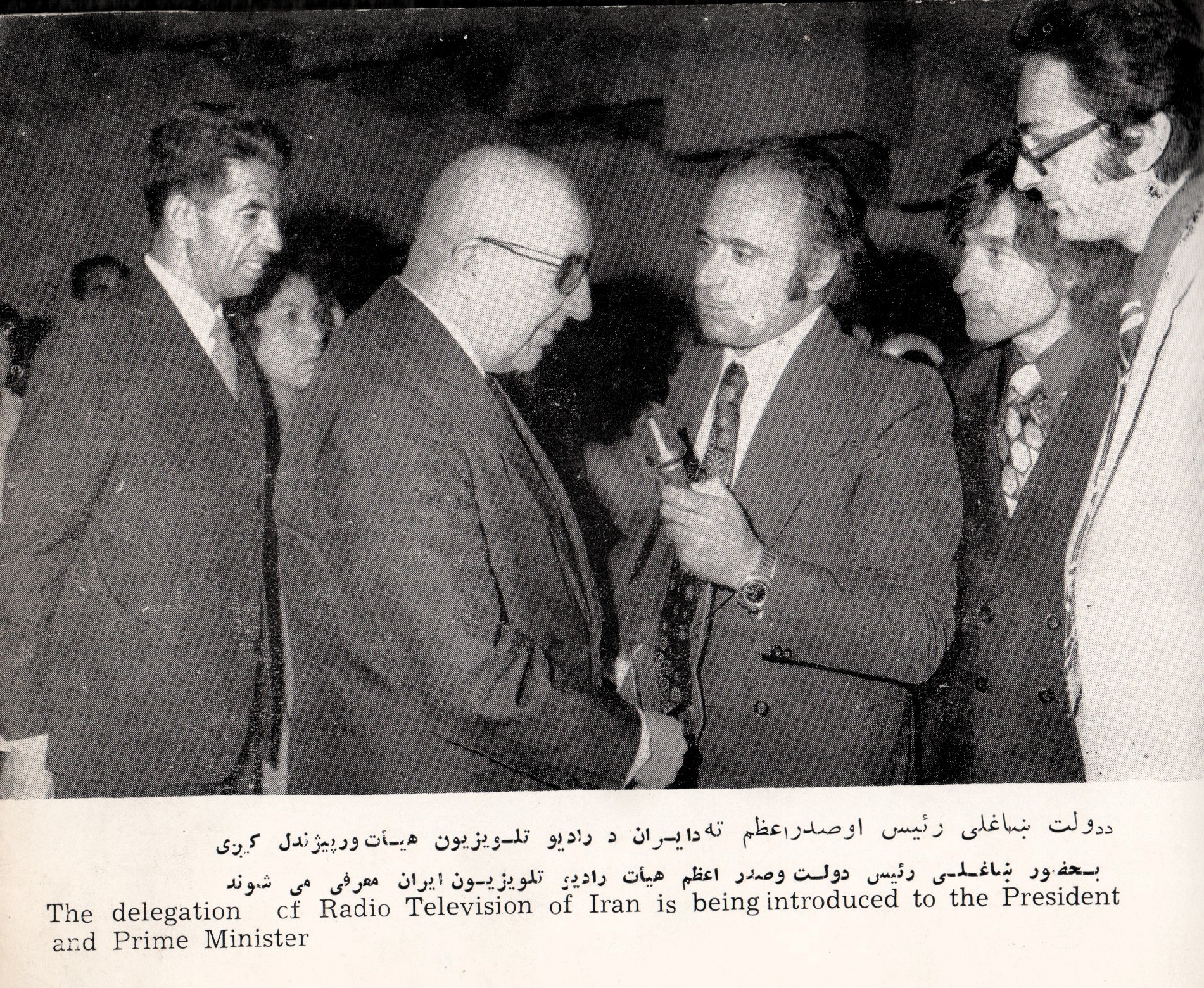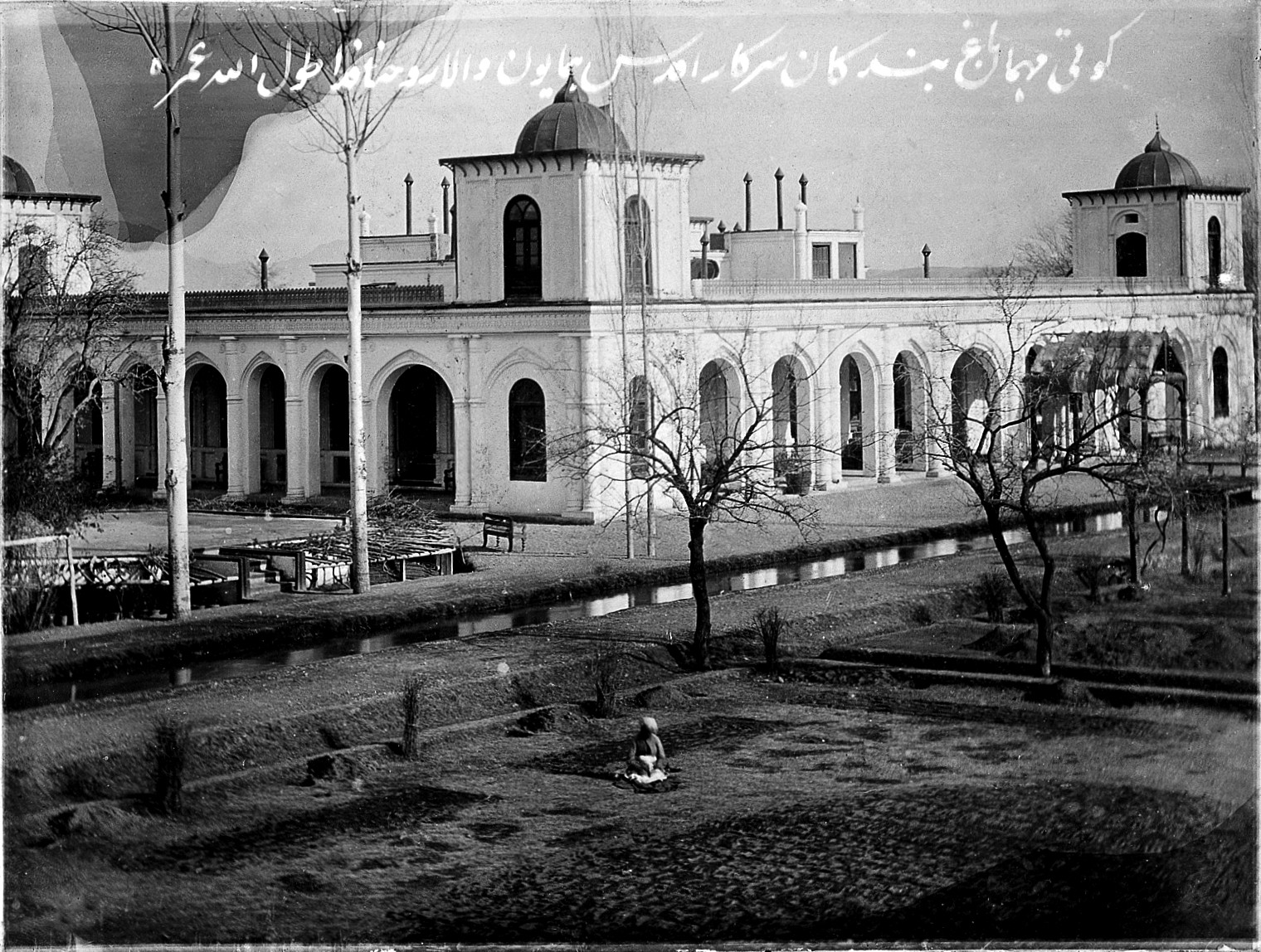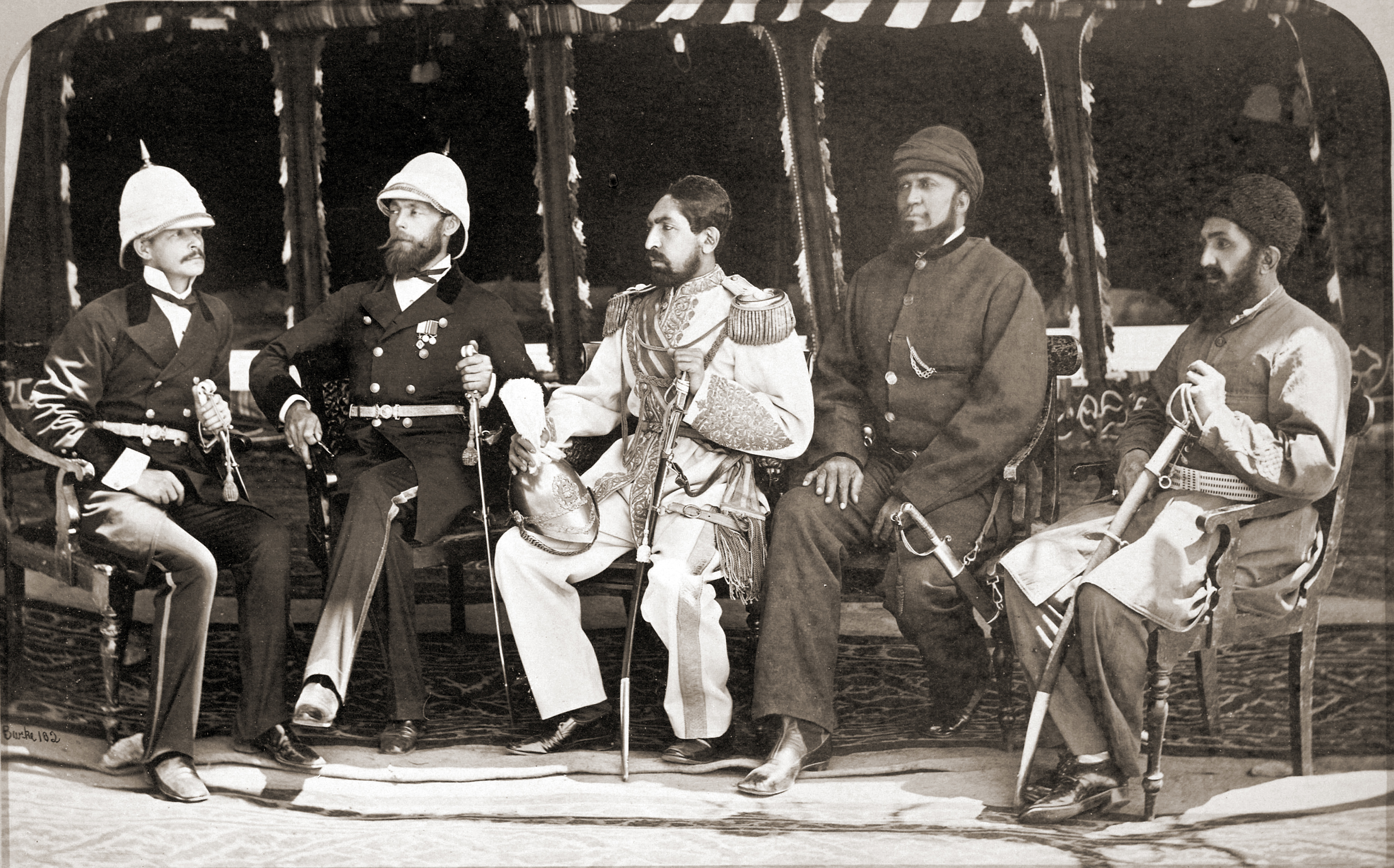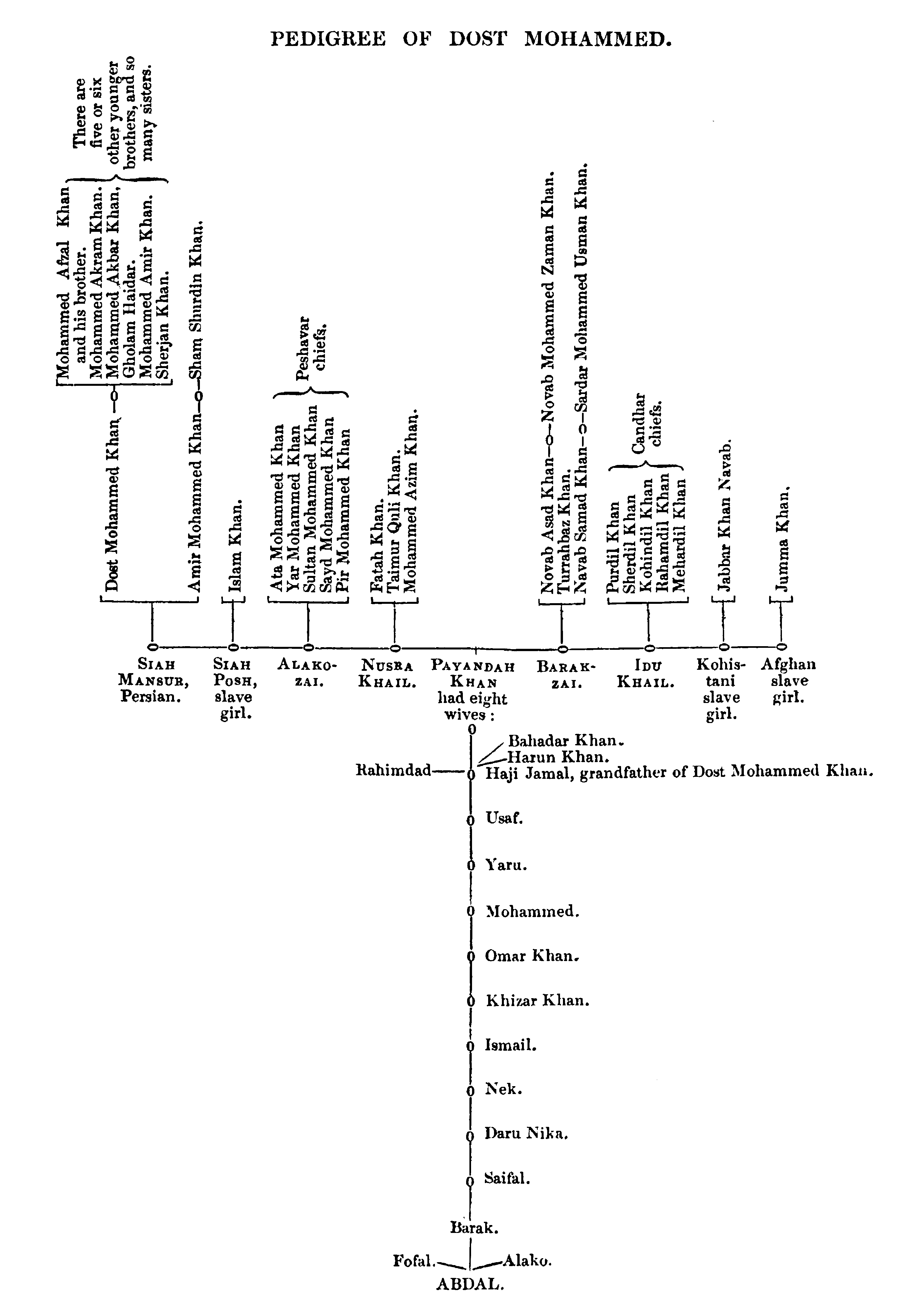|
Mohammedzai
Mohammadzai ( ps, محمدزی), also spelled Moḥammadzay (meaning "descendants of Mohammad"), is a Pashtun sub-tribe or clan of the Barakzai which is part of the Durrani confederacy of tribes. They are primarily centered on Kandahar, Kabul and Ghazni in Afghanistan. The Mohammadzai ruled Afghanistan from 1823 to 1978, for a total of 155 years. The monarchy ended under Mohammad Zahir Shah when his brother in law Sardar Daoud Khan took power via a coup. Distribution Mohammadzai are the most prominent and powerful branch of the Durrani confederacy, and are primarily centered on Kandahar. They can also be found in other provinces throughout Afghanistan as well as across the border in present-day Pakistan. Musahiban are the descendants of Sultan Mohammad Khan, also known as "Telai". Telai means Gold in Dari. He was the elder brother of Dost Mohammed Khan. Language The principal language of the Mohammadzai is Pashto, more specifically the Southern (Kandahari) dialect of Pashto. ... [...More Info...] [...Related Items...] OR: [Wikipedia] [Google] [Baidu] |
Dost Mohammad Khan
Dost Mohammad Khan Barakzai (Pashto/Persian: ; 23 December 17929 June 1863), nicknamed the Amir-i Kabir, Also titled Amir al-Mu'minin, was a member of the Barakzai dynasty and one of the prominent rulers of the Emirate of Afghanistan. His 37-year rule was important in the creation of modern Afghanistan. With the decline of the Durrani dynasty, he became the Emir of Kabul in 1826. He was the 11th son of Payendah Khan, chief of the Barakzai Pashtuns, who was killed in 1799 by Afghan Emperor Zaman Shah Durrani. Dost Mohammad began his official reign at the beginning of his rule in 1826 when he usurped Kabul. However, he had taken Kabul a few years prior in 1818, as well as later returning to power in 1843 after the First Anglo-Afghan War, where his rule was disputed from 1839 to 1842 by Shah Shuja Durrani. When Dost Mohammad ascended to the rule of Kabul, the Afghan realm faced a period of decline. Beset by civil war between the sons of Timur Shah Durrani, the formerly large Durran ... [...More Info...] [...Related Items...] OR: [Wikipedia] [Google] [Baidu] |
Daoud Khan
Mohammed Daoud Khan ( ps, ), also romanized as Daud Khan or Dawood Khan (18 July 1909 – 28 April 1978), was an Afghan politician and general who served as prime minister of Afghanistan from 1953 to 1963 and, as leader of the 1973 Afghan coup d'état which overthrew the monarchy, served as the first president of Afghanistan from 1973 to 1978, establishing an autocratic one-party system. Born into the Afghan royal family and addressed by the prefix "Sardar", Khan started as a provincial governor and later a military commander before being appointed as Prime Minister by his cousin, King Mohammed Zahir Shah. Having failed to persuade the King to implement a one-party system, Khan overthrew the monarchy with the backing of Afghan Army officers, and proclaimed himself the first President of the Republic of Afghanistan. Khan was known for his autocratic rule, and for his educational and progressive social reforms. Under his regime, he headed a purge of communists in the government, ... [...More Info...] [...Related Items...] OR: [Wikipedia] [Google] [Baidu] |
Amanullah Khan
Ghazi Amanullah Khan (Pashto and Dari: ; 1 June 1892 – 25 April 1960) was the sovereign of Afghanistan from 1919, first as Emir and after 1926 as King, until his abdication in 1929. After the end of the Third Anglo-Afghan War in August 1919, Afghanistan was able to relinquish its protected state status to proclaim independence and pursue an independent foreign policy free from the influence of the United Kingdom. His rule was marked by dramatic political and social change, including attempts to modernise Afghanistan along Western lines. He did not fully succeed in achieving this objective due to an uprising by Habibullah Kalakani and his followers. On 14 January 1929, Amanullah abdicated and fled to neighbouring British India as the Afghan Civil War began to escalate. From British India, he went to Europe, where after 30 years in exile, he died in Italy, in 1960 (yet apparently and reportedly according to the ''Encyclopaedia Britannica'', Amanullah died in Zürich in Switz ... [...More Info...] [...Related Items...] OR: [Wikipedia] [Google] [Baidu] |
Habibullah Khan
Habibullah Khan (Pashto/Dari: ; 3 June 1872 – 20 February 1919) was the Emir of Afghanistan from 1901 until his death in 1919. He was the eldest son of the Emir Abdur Rahman Khan, whom he succeeded by right of primogeniture in October 1901. His grandfather was Mohammad Afzal Khan. Early life Habibullah was the eldest son of Emir Abdur Rahman, and was born in Samarkand, Uzbekistan in 1871. He had a younger brother, born on December 7, 1874, Nasrullah Khan. Reign Habibullah was a relatively reform-minded ruler who attempted to modernize his country. During his reign he worked to bring modern medicine and other technology to Afghanistan. Many people who were forced into exile by his father were returned to Afghanistan by a general amnesty decreed by Habibullah. In 1903, Habibullah founded the Habibia school as well as a military academy. He also worked to put in place progressive reforms in his country. He instituted various legal reforms and repealed many of the harshes ... [...More Info...] [...Related Items...] OR: [Wikipedia] [Google] [Baidu] |
Abdur Rahman Khan
Abdur Rahman Khan GCSI (Pashto/Dari: ) (between 1840 and 1844 – 1 October 1901) was Emir of Afghanistan from 1880 to his death in 1901. He is known for uniting the country after years of internal fighting and negotiation of the Durand Line Agreement with British India. Abdur Rahman Khan was the first child and only son of Mohammad Afzal Khan, and grandson of Dost Mohammad Khan, founder of the Barakzai dynasty. Abdur Rahman Khan re-established the writ of the Afghan government after the disarray that followed the second Anglo-Afghan war. He became known as ''The Iron Amir'' because his government was a military despotism. This despotism rested upon a well-appointed army and was administered through officials subservient to an inflexible will and controlled by a widespread system of espionage. The nickname, ''The Iron Amir'', is also associated due to his victory over a number of rebellions by various tribes who were led by his relatives. One source says that during his reign t ... [...More Info...] [...Related Items...] OR: [Wikipedia] [Google] [Baidu] |
Mohammad Yaqub Khan
Mohammad Yaqub Khan (Pashto/Dari: ; 1849November 15, 1923) was Emir of Afghanistan from February 21 to October 12, 1879. He was the son of the previous ruler, Sher Ali Khan. Mohammad Yaqub Khan was appointed as the governor of Herat province in 1863. In 1870, he decided to rebel against his father but failed and was imprisoned in 1874. The Second Anglo-Afghan War erupted in 1878, leading Sher Ali Khan to flee the capital of Afghanistan, and eventually die in February 1879 in the north of the country. As Sher Ali's successor, Yaqub signed the Treaty of Gandamak with Britain in May 1879, relinquishing sole control of Afghanistan foreign affairs to the British Empire. An uprising against this agreement led by Ayub Khan in October of the same year, led to the abdication of Yaqub Khan. He was succeeded by the new ruler, Amir Ayub Khan. Treaty of Gandamak During the Second Anglo-Afghan War, the British defeated the Amir Sher Ali's forces, wintered in Jalalabad, waiting for the new Am ... [...More Info...] [...Related Items...] OR: [Wikipedia] [Google] [Baidu] |
Sher Ali Khan
Sher Ali Khan (); c. 1825 – 21 February 1879) was Amir of Afghanistan from 1863 to 1866 and from 1868 until his death in 1879. He was one of the sons of Dost Mohammed Khan, founder of the Barakzai dynasty in Afghanistan. Life Sher Ali Khan was born into a Pashtun family, Initially he seized power when his father died, but was quickly ousted by his older brother, Mohammad Afzal Khan. Internecine warfare followed until Sher Ali Khan defeated his brother and regained the title of Emir. Reforms Sher Ali Khan's reign as Amir is often remembered for his attempts at reforming Barakzai rule in Afghanistan. Changes brought during the period of Sher Ali Khan's rule include the creation of governmental posts, military reform, the introduction of the first postal service in Afghanistan and the first attempts of an Afghan leader at promoting the Pashto language. Sher Ali Khan tried to limit the power of the Barakzai sardars. He didn't allow his sons to administer provinces and ins ... [...More Info...] [...Related Items...] OR: [Wikipedia] [Google] [Baidu] |
Dost Mohammad Khan (Emir Of Afghanistan)
Dost Mohammad Khan Barakzai (Pashto/Persian: ; 23 December 17929 June 1863), nicknamed the Amir-i Kabir, Also titled Amir al-Mu'minin, was a member of the Barakzai dynasty and one of the prominent rulers of the Emirate of Afghanistan. His 37-year rule was important in the creation of modern Afghanistan. With the decline of the Durrani dynasty, he became the Emir of Kabul in 1826. He was the 11th son of Payendah Khan, chief of the Barakzai Pashtuns, who was killed in 1799 by Afghan Emperor Zaman Shah Durrani. Dost Mohammad began his official reign at the beginning of his rule in 1826 when he usurped Kabul. However, he had taken Kabul a few years prior in 1818, as well as later returning to power in 1843 after the First Anglo-Afghan War, where his rule was disputed from 1839 to 1842 by Shah Shuja Durrani. When Dost Mohammad ascended to the rule of Kabul, the Afghan realm faced a period of decline. Beset by civil war between the sons of Timur Shah Durrani, the formerly large Durra ... [...More Info...] [...Related Items...] OR: [Wikipedia] [Google] [Baidu] |
Barakzai Dynasty
The two branches of the Barakzai dynasty (, "sons of Barak") ruled modern day Afghanistan from 1823 to 1973 when the monarchy ended under Musahiban Mohammed Zahir Shah. The Barakzai dynasty was established by Dost Mohammad Khan after the Durrani dynasty of Ahmad Shah Durrani was removed from power. At the start of Barakzai rule in March 1823, the Afghans lost their former stronghold of Peshawar Valley to the Sikh Khalsa Army of Ranjit Singh at the Battle of Nowshera. The Afghan forces in the battle were supported by Azim Khan, half-brother of Dost Mohammad Khan. During the Barakzai era, Afghanistan saw much of its territory lost to the British in the south and east, Persia in the west, and Russia in the north. There were also many conflicts within Afghanistan, including the three major Anglo-Afghan wars and the 1928–29 civil war. History and background The Barakzai dynasty was the line of rulers in Afghanistan in the 19th and 20th centuries. Following the fall of the Dur ... [...More Info...] [...Related Items...] OR: [Wikipedia] [Google] [Baidu] |
Pashto Language
Pashto (,; , ) is an Eastern Iranian language in the Indo-European language family. It is known in historical Persian literature as Afghani (). Spoken as a native language mostly by ethnic Pashtuns, it is one of the two official languages of Afghanistan alongside Dari,Constitution of Afghanistan �''Chapter 1 The State, Article 16 (Languages) and Article 20 (Anthem)''/ref> and it is the second-largest provincial language of Pakistan, spoken mainly in Khyber Pakhtunkhwa and the northern districts of Balochistan. Likewise, it is the primary language of the Pashtun diaspora around the world. The total number of Pashto-speakers is at least 40 million, (40 million) although some estimates place it as high as 60 million. Pashto is "one of the primary markers of ethnic identity" amongst Pashtuns. Geographic distribution A national language of Afghanistan, Pashto is primarily spoken in the east, south, and southwest, but also in some northern and western parts of the country. The ... [...More Info...] [...Related Items...] OR: [Wikipedia] [Google] [Baidu] |
Dost Mohammed Khan
Dost Mohammad Khan Barakzai (Pashto/Persian: ; 23 December 17929 June 1863), nicknamed the Amir-i Kabir, Also titled Amir al-Mu'minin, was a member of the Barakzai dynasty and one of the prominent rulers of the Emirate of Afghanistan. His 37-year rule was important in the creation of modern Afghanistan. With the decline of the Durrani dynasty, he became the Emir of Kabul in 1826. He was the 11th son of Payendah Khan, chief of the Barakzai Pashtuns, who was killed in 1799 by Afghan Emperor Zaman Shah Durrani. Dost Mohammad began his official reign at the beginning of his rule in 1826 when he usurped Kabul. However, he had taken Kabul a few years prior in 1818, as well as later returning to power in 1843 after the First Anglo-Afghan War, where his rule was disputed from 1839 to 1842 by Shah Shuja Durrani. When Dost Mohammad ascended to the rule of Kabul, the Afghan realm faced a period of decline. Beset by civil war between the sons of Timur Shah Durrani, the formerly large Durr ... [...More Info...] [...Related Items...] OR: [Wikipedia] [Google] [Baidu] |
Dari Language
Dari (, , ), also known as Dari Persian (, ), is the Variety (linguistics), variety of the Persian language spoken in Afghanistan. Dari is the term officially recognised and promoted since 1964 by the Politics of Afghanistan, Afghan government for the Persian language,Lazard, G.Darī – The New Persian Literary Language", in ''Encyclopædia Iranica'', Online Edition 2006. hence it is known as Afghan Persian or Eastern Persian in many Western sources. As Professor Nile Green remarks "the impulses behind renaming of Afghan Persian as Dari were more nationalistic than linguistic" in order to create an Afghan state narrative. Apart from a few basics of vocabulary, there is little difference between formal written Persian of Afghanistan and Iran. The term "Dari" is officially used for the characteristic spoken Persian of Afghanistan, but is best restricted to formal spoken registers. Persian-speakers in Afghanistan prefer to still call their language “Farsi,” while Pashto-s ... [...More Info...] [...Related Items...] OR: [Wikipedia] [Google] [Baidu] |










_in_Afghanistan.jpg)